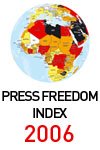Worldwide Press Freedom Index 2006
North Korea, Turkmenistan, Eritrea the worst violators of press freedom.
France, the United States and Japan slip further — Mauritania and Haiti gain much ground
New countries have moved ahead of some Western democracies in the fifth annual Reporters Without Borders Worldwide Press Freedom Index, issued today, while the most repressive countries are still the same ones.
“Unfortunately nothing has changed in the countries that are the worst predators of press freedom,” the organisation said, “and journalists in North Korea, Eritrea, Turkmenistan, Cuba, Burma and China are still risking their life or imprisonment for trying to keep us informed. These situations are extremely serious and it is urgent that leaders of these countries accept criticism and stop routinely cracking down on the media so harshly.
“Each year new countries in less-developed parts of the world move up the Index to positions above some European countries or the United States. This is good news and shows once again that, even though very poor, countries can be very observant of freedom of expression. Meanwhile the steady erosion of press freedom in the United States, France and Japan is extremely alarming,” Reporters Without Borders said.



 Poasis II: Selected Poems 2000-2024
Poasis II: Selected Poems 2000-2024 “Todesguge/Deathfugue”
“Todesguge/Deathfugue” “Interglacial Narrows (Poems 1915-2021)”
“Interglacial Narrows (Poems 1915-2021)” “Always the Many, Never the One: Conversations In-between, with Florent Toniello”
“Always the Many, Never the One: Conversations In-between, with Florent Toniello” “Conversations in the Pyrenees”
“Conversations in the Pyrenees” “A Voice Full of Cities: The Collected Essays of Robert Kelly.” Edited by Pierre Joris & Peter Cockelbergh
“A Voice Full of Cities: The Collected Essays of Robert Kelly.” Edited by Pierre Joris & Peter Cockelbergh “An American Suite” (Poems) —Inpatient Press
“An American Suite” (Poems) —Inpatient Press “Arabia (not so) Deserta” : Essays on Maghrebi & Mashreqi Writing & Culture
“Arabia (not so) Deserta” : Essays on Maghrebi & Mashreqi Writing & Culture “Barzakh” (Poems 2000-2012)
“Barzakh” (Poems 2000-2012) “Fox-trails, -tales & -trots”
“Fox-trails, -tales & -trots” “The Agony of I.B.” — A play. Editions PHI & TNL 2016
“The Agony of I.B.” — A play. Editions PHI & TNL 2016 “The Book of U / Le livre des cormorans”
“The Book of U / Le livre des cormorans” “Memory Rose Into Threshold Speech: The Collected Earlier Poetry of Paul Celan”
“Memory Rose Into Threshold Speech: The Collected Earlier Poetry of Paul Celan” “Paul Celan, Microliths They Are, Little Stones”
“Paul Celan, Microliths They Are, Little Stones” “Paul Celan: Breathturn into Timestead-The Collected Later Poetry.” Translated & with commentary by Pierre Joris. Farrar, Straus & Giroux
“Paul Celan: Breathturn into Timestead-The Collected Later Poetry.” Translated & with commentary by Pierre Joris. Farrar, Straus & Giroux